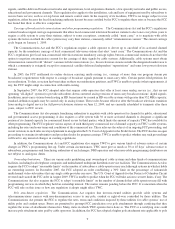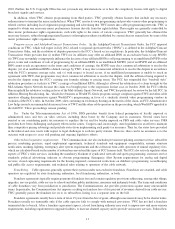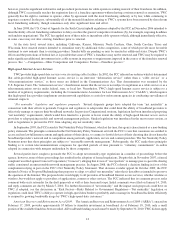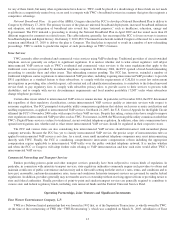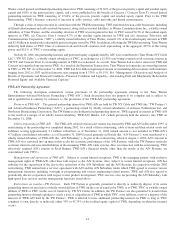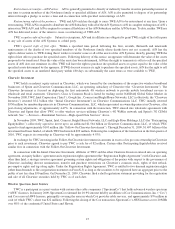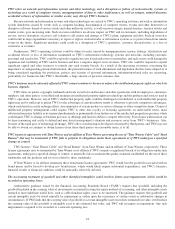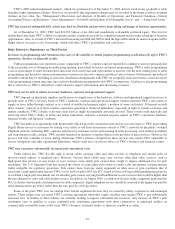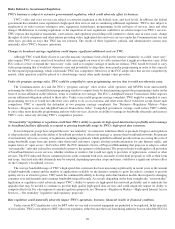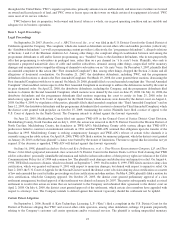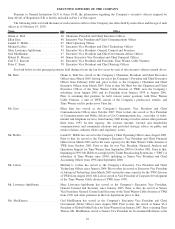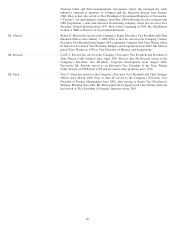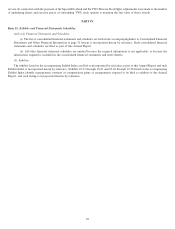Time Warner Cable 2009 Annual Report Download - page 31
Download and view the complete annual report
Please find page 31 of the 2009 Time Warner Cable annual report below. You can navigate through the pages in the report by either clicking on the pages listed below, or by using the keyword search tool below to find specific information within the annual report.TWC’s 2009 annual impairment analysis, which was performed as of December 31, 2009, did not result in any goodwill or cable
franchise rights impairment charges. However, it is possible that impairment charges may be recorded in the future to reflect potential
declines in fair value. See “Management’s Discussion and Analysis of Results of Operations and Financial Condition—Critical
Accounting Policies and Estimates—Asset Impairments—Goodwill and Indefinite-lived Intangible Assets” and “—Long-lived Assets.”
TWC has incurred substantial debt, which may limit its flexibility and prevent it from taking advantage of business opportunities.
As of December 31, 2009, TWC had $21.583 billion of net debt and mandatorily redeemable preferred equity. This level of
indebtedness may limit TWC’s ability to respond to market conditions, provide for capital investment needs or take advantage of business
opportunities. Also, as a result of TWC’s increased borrowings in 2008 and 2009 to fund the Special Dividend, its interest expense will be
higher than it was prior to the borrowings, which will affect TWC’s profitability and cash flows.
Risks Related to Dependence on Third Parties
Increases in programming and retransmission costs or the inability to obtain popular programming could adversely affect TWC’s
operations, business or financial results.
Video programming costs represent a major component of TWC’s expenses and are expected to continue to increase primarily due
to the increasing cost of obtaining desirable programming, particularly broadcast and sports programming. TWC’s video programming
costs as a percentage of video revenues have increased over recent years and will continue to increase over the next coming years as cable
programming and broadcast station retransmission consent cost increases outpace growth in video revenues. Furthermore, providers of
desirable content may be unwilling to enter into distribution arrangements with TWC on acceptable terms and owners of non-broadcast
video programming content may enter into exclusive distribution arrangements with TWC’s competitors. A failure to carry programming
that is attractive to TWC’s subscribers could adversely impact subscription and advertising revenues.
TWC may not be able to obtain necessary hardware, software and operational support.
TWC depends on third party suppliers and licensors to supply some of the hardware, software and operational support necessary to
provide some of TWC’s services. Some of TWC’s hardware, software and operational support vendors represent TWC’s sole source of
supply or have, either through contract or as a result of intellectual property rights, a position of some exclusivity. If demand exceeds
these vendors’ capacity or if these vendors experience operating or financial difficulties, especially in light of current economic and
market conditions, TWC’s ability to provide some services might be materially adversely affected. These events could materially and
adversely affect TWC’s ability to retain and attract subscribers, and have a material negative impact on TWC’s operations, business,
financial results and financial condition.
TWC has multi-year agreements with Sprint under which it provides certain functions and services necessary to TWC in providing
Digital Phone service to customers by routing voice traffic to and from destinations outside of TWC’s network via the public switched
telephone network, delivering E911, operator and directory assistance service and assisting in order processing, local number portability
and long-distance traffic carriage. TWC recently launched an initiative to replace Sprint as the provider of these services. However, the
process will take a number of years, during which time TWC’s reliance on Sprint for these services may render TWC vulnerable to
service disruptions and other operational difficulties, which could have an adverse effect on TWC’s business and financial results.
TWC may encounter substantially increased pole attachment costs.
Under federal law, TWC has the right to attach cables carrying video and other services to telephone and similar poles of
investor-owned utilities at regulated rates. However, because these cables may carry services other than video services, such as
high-speed data services or new forms of voice services, some utility pole owners have sought to impose additional fees for pole
attachment. The U.S. Supreme Court has rejected the efforts of some utility pole owners to make cable attachments carrying Internet
traffic ineligible for regulatory protection. Pole owners have, however, made arguments in other areas of pole regulation that, if
successful, could significantly increase TWC’s costs. In November 2007, the FCC issued a Notice of Proposed Rulemaking that proposes
to establish a single pole attachment rate for all utility pole owners carrying broadband Internet access services that would be higher than
the rate charged for video and cable modem service. In addition, in August 2009, a coalition of electric utility companies petitioned the
FCC to declare that the pole attachment rate for cable companies’ digital telephone service should be assessed at the higher rate paid by
telecommunications providers rather than the rate paid by cable providers.
Some of the poles TWC uses are exempt from federal regulation because they are owned by utility cooperatives and municipal
entities. These entities may not renew TWC’s existing agreements when they expire, and they may require TWC to pay substantially
increased fees. A number of these entities are currently seeking to impose substantial rate increases. Any increase in TWC’s pole
attachment rates or inability to secure continued pole attachment agreements with these cooperatives or municipal utilities on
commercially reasonable terms could cause TWC’s business, financial results or financial condition to suffer.
19


